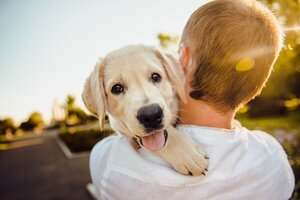5 Myths of owning a puppy
If you’ve been lucky enough to welcome a new puppy into your family, you’ll know how difficult the first few weeks can be. It might have been several years since you owned a puppy, or it might be your first time!
From the time your puppy is 8 weeks old, they are like a sponge: exploring their surroundings, learning and absorbing. This is why its super important to make sure your puppy has positive experiences because these experiences can dictate how your puppy behaves as an adult.
At Doncaster Vet Hospital, we get asked lots of questions about raising a puppy and we also hear lots of misinformation. Here are the 5 most common myths about puppies that we hear.
1. If your puppy has an accident, rub their nose in it
This is one of the most common myths we hear and it could not be further from the truth. Firstly, a puppy won’t understand why you are doing it and it certainly won’t teach them not to, and it can also make them fearful of you.
Toilet training takes time and you need to make sure you are giving your puppy every opportunity to do the right thing and go to the toilet outside. Common signs that your puppy is about to relieve themselves includes sniffing, restlessness, circling and crying.
If you catch your puppy in the act of relieving themselves, try and get them to follow you outside or pick them up. When they do relieve themselves outside, make sure you celebrate and let them know how happy you are with pats and praise. This will give them a positive association with relieving themselves outside.
If you find an accident, wipe it up and use a smell-masker like Urine-off to spray so they won’t keep relieving themselves in the same place.
2. I need to be with my puppy 24/7
While puppies do need constant supervision, if you do not give them time alone, they may develop separation anxiety.
Try leaving your puppy for a few minutes at a time to begin with. Make sure you give them a toy or treat before you leave the room so they are occupied and associate you leaving for something fun or delicious. Don’t give them rawhide as it is a choking hazard, but another treat or toy will do.
Gradually extend these times. If your puppy is whining and scratching when you leave, you might have taken too long and they haven’t learned to associate the area with good things. Just remember to not come back into the room if they are fussing. This will teach them that the wrong behaviour gets them what they want.
Instead, shorten their time in the confinement area to what they can handle, and build the time more slowly.
3. Puppy biting is ok
Puppies use their mouths to explore their surroundings so there is a certain amount of biting and nipping that is normal. But they should not be allowed to bite skin.
If your puppy does start to bite your hands, take them away and give the puppy a toy to play with instead. You should also ignore your puppy when they are biting and reward them with attention when they stop. You can lower arousal levels with training sessions in-between play times to distract them and motivate them to do what you want.
Don’t ever hit your puppy as this can lead to more biting or fearful behaviour.
4. Puppies should eat as much as possible
Puppies have a lot of growing to do, but you still need to control their food consumption. Set a schedule as this will also help you get an idea on their toilet habits.
Generally, your puppy should be fed 3 times a day and your vet will be able to advise you on the best food to give them based on their age and breed. Puppies should stay on puppy food until they are around 12 months of age or older if they are a larger breed.
5. Puppies can’t socialise until they have all their vaccinations
Yes, this is technically true, but socialising your puppy is very important and there are still ways you can do it safely.
While you shouldn’t take your puppy for a walk down the street, you could take them to a friend’s house to get them used to new environments. If you know friends or a family member with a well-behaved, patient older dog who is healthy and up-to-date on their vaccinations, you can introduce your puppy to them so they can learn how to act around other dogs.
Make sure they first meet in a neutral space, i.e. front yard or park in order to avoid territory issues. Make sure the meeting is positive and not rushed as introductions should be slow and monitored. If your puppy starts displaying signs of stress or fear, remove them from the situation.
You should be introducing your puppy to new noises as well. Youtube has a range of videos with noises like babies crying, beeping cars and thunder. Reward your puppy with treats when they hear these noises, and you’ll be helping them overcome any fear or anxiety.
Although COVID-19 may have disrupted your plans to go to puppy school, you can still do your part to help your puppy have a great experience while they are growing up. And with restrictions lifting, our puppy school may be restarting in the next few weeks.
If you’d like to put your name down on the waiting list to be informed of when our Doncaster vet puppy school is commencing, please contact us.



